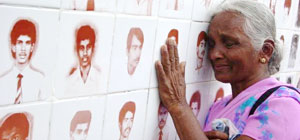By Veeragathy Thanabalasingham
Colombo, December 10 (newsin.asia): India’s National Security Adviser Ajit Doval, who visited Sri Lanka last week, met with the Tamil National Alliance (TNA) leader R Sampanthan at the India House for about half an hour before returning to New Delhi.
It is learned that the two talked about the future of the provincial councils which would give some devolution to the Tamils and the 13th Amendment to the Constitution which led to it and agreed to keep what they discussed secret owing to the sensitivity of the issue.
Doval had expressed interest in the economic development of the northern and eastern provinces and had advised Sampanthan that the TNA should focus more on economic development.
The fact is, in the current context, India does not want or is unable to put pressure on the Sri Lankan government on domestic political issues, such as the constitution and devolution. The Indian Prime Minister, Narendra Modi, during his official meetings with the Rajapaksa brothers made it a point to insist that Sri Lankan Tamils’ aspirations must be addressed through the full implementation of the 13th amendment. But this has been of no avail.
The Rajapaksa brothers always maintained a studied silence in front of Modi and later used to give lengthy interviews to prominent English newspapers in Delhi itself proclaiming that they were unable to grant anything against the will of the Sinhala majority. That was their response to Modi’s request regarding the Tamil problem.
On its part, India would certainly continue to raise the issue. But the fact is, in the current context, India doesn’t want to put pressure on the Sri Lankan government in regard to domestic political issues. India is not prepared to alienate or contradict Colombo at a time when it is engaged in strategic moves with the United States to curb China’s growing influence in the Indian Ocean region. India does not wish to alienate or get into a conflict with Colombo. Therefore, India will not take any action that would embarrass the Rajapaksa government. That is the geopolitical reality today.
Therefore, it is more prudent for India to be concerned with economic development than to be at odds with the government over the political issues of the Tamils in the North and East. If the TNA is willing to cooperate with the government in this regard, India is ready to provide assistance for development projects in the Tamil areas. This is India’s current approach to the Tamil issue. If the TNA does not cooperate they cannot expect anything from India.
The need therefore is for the leaders of the TNA to change their political strategy and action in line with this approach, which India considers convenient at present. Another important question is how they are going to fulfil it.
As far as the TNA is concerned, it cannot be said that they are not at all focused on the economic development of their areas. The parliamentarians of the TNA implement economic projects with the funds allocated to them annually. But aside from the fact that the funds are not adequate, their main focus continues to be on a political solution to the ethnic problem.
Most of the MPs in the TNA speak emotionally and live in the past. In the changed geopolitical arena, they are unable to devise new approaches to guide the Tamil people in the post-war period. The Tamils are not accustomed to a political culture that collaborates with the government in Colombo. Since all the governments have discriminated against the Tamils, the Tamil political parties have always engaged in oppositional politics. Therefore, it has become customary for Tamils to call politicians who work with the government ‘traitors’.
Although it is difficult for Tamils and their political representatives to change from such a political culture, the situation has changed since the end of the Eelam war and therefore it requires a change in their political culture too.
When the Maithripala Sirisena-Ranil Wickremsinghe led government embarked on the process of drafting a new constitution, the TNA collaborated with the government in an attempt to find a political solution to the ethnic problem through that process. Although the TNA did not join the government it fully supported it. As the new constitution drafting process failed, the TNA’s influence among Tamils began to wane. Even cooperating with Colombo was to no avail, the Tamils felt.
In such a scenario, it is an embarrassment to the TNA when India asks it to co-operate with the current Rajapaksa government in economic development activities.
The Rajapaksa government is pursuing development projects in the north and east without consulting Tamil parliamentarians in those areas. The TNA and other Tamil parties believe that the government should consult them prior to undertaking any development activities in the Tamil regions. If the government proceeds to adopt a strategy that includes Tamil MPs in its development activities in the North and East, it will be easier for them to co-operate in economic development activities as per India’s insistence. India should use its goodwill to persuade the Rajapaksa government to consult the Tamil leadership.
The Tamil parties must not give up the basic aspirations and ideology of the Tamils’ struggle for their legitimate rights. But at the same time they must prepare themselves to adopt a short-term pragmatic political approach or strategies to address the post war economic and humanitarian needs of the Tamil people especially given the current context.
The necessity to give up the traditional confrontational politics to facilitate a new approach in the interests of their people doesn’t have to necessarily mean surrendering to Colombo.
(Veeragathy Thanabalasingham is a Senior Colombo-based Journalist)



























































